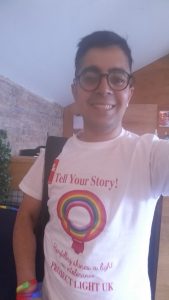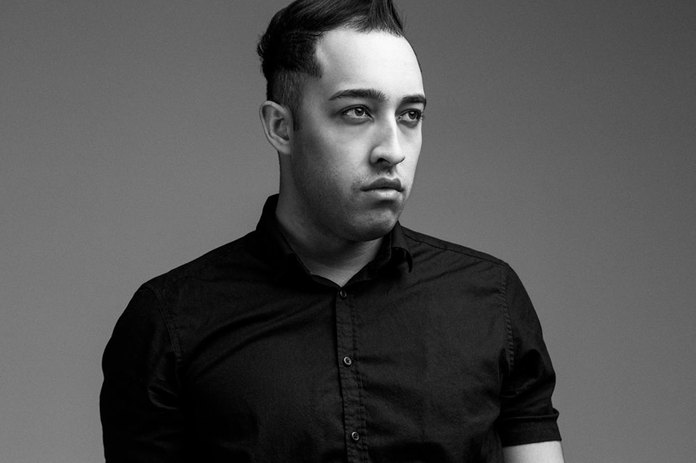What’s life really like for LGBT people of faith?
By Will Stroude

Ahmer Bashir spent much of his Bradford-based childhood repressing his sexuality, telling himself his religion forbade it. Raised in a strict Pakistani Muslim household – one split between Sunni Islam and Wahhabism – he feared the repercussions coming out would bring from both his extended family and God.
Unable to abandon faith altogether, he began exploring other religions, trawling through their holy texts in the hope he’d find something there to ease his conscience. Brief flirtations with the Jehovah’s Witness, Ahmaddiya Muslim and mainstream Christianity faiths brought little respite to his inner torment, so Bashir kept his sexuality secret from everyone.
“I needed to find a reason to accept myself and I just didn’t find it,” says Bashir. “I just went in to faith to, I dunno, to find answers. These answers only led me to suppress my sexuality. For me, those were dark uncertain days.”
In 2008, he and his dad embarked on a four-country pilgrimage as practising Muslims; a life-changing trip which made him question the impact his faith was having on his mental health.
“My mum died and I’d started having questions in my head about why on Earth I was putting up with a life without love – I was really miserable,” he says. “In 2007, I went on this pilgrimage with my dad, because I still had this connection over the years: me and god. When I got to the place where Jesus was allegedly born, it kind of all came to a head and I just said to god ‘no, you must hate me’. All I could think of was that I was handicapped from the moment I was born, denied a normal life.”
The pilgrimage took Bashir from Jordan, Syria, Israel and Saudi Arabia. It was when he reached Mecca that he had finally begun to make peace with his sexuality and reconcile his conflicting identities.
“It is strange when I look back on that moment,” he recalls. “When I got to Mecca, I knew that I was born this way. I came back to England and started accepting my sexuality. I went to university and became more confident in my identity, talking to people I used to view from a distance. I was 100% me. But still, I was not able to come out of the closet. In 2015, I told my family, one by one – seven siblings, one by one.”

“All I could think of was that I was handicapped from the moment I was born” – Ahmer Bashir
One of the seven, an older brother, stopped speaking to Bashir after he came out. He justified the rejection with “religious honour” and to this day has kept his silence. It hurt Bashir, but even being shunned by a brother isn’t enough to halt his coming out, a journey which culminated in him taking part in a radio interview for Leeds Pride this year, as well as participating in a London Pride documentary.
“It is upsetting, it’s hurtful, but I’m not going to pretend I’m someone I’m not,” says Bashir. “I created Project Light [a workshop for LGBT people of faith] because I think it’s down to all of us to help each other be brave enough to be who we are. We need to share our journey to acceptance to help people understand. I’m happy with who I am. I learned you can’t reject your sexuality. My biggest and longest learned lesson is to accept myself. You have to embrace who you are.”
Like Bashir, Mustafa* was born into a Muslim family. Living in Manchester and the second of four children, from the age of five his father taught him Arabic so that he could read the Quran and pray. Faith was always a part of Mustafa’s life, and it was his engagement with the Quranic stories which form one of his earliest memories of sexuality.
“The most common [story] with regards to homosexuality is the story of the Prophet Lot, a prophet whose people are punished with a brimstone shower because they were engaging in acts of sodomy,” says Mustafa. “That was the first time it dawned on me that maybe there’s a problem here and you begin to feel a bit guilty. I must’ve been about ten or 11 when I first heard that story. That’s when you begin to realise there’s a conflict here.”
Mustafa’s faith led him to internalise the guilt and ask questions like “am I going to hell?” His shame was compounded when he inadvertently came out to his mum at 15, after she found letters in his room alluding to his sexuality. Faced with a brokenhearted mother, he agreed to “change and pray”.
“When you’re 15 and you’re quite close to your mum and she breaks down in tears, what else can you say?” he says. They barely broached the subject of his sexuality until last year, when his parents struck up a conversation in which they encouraged him to marry a woman. Though he gently reminded them that he is gay and would therefore not marry a woman, it’s become something of a recurring topic.
For Mustafa himself, it wasn’t until he started medical school that he finally began addressing his own decade-long conflict between sexuality and faith.
“In my early years at medical school I really did question it for a long time and thought ‘what am I gonna do’ essentially,” he says. “It was a really dark time. What I came to realise was for me regardless of whether my religion says this is acceptable or not, my first and foremost goal in life is to be happy. If living with a man and being in love with a man makes me happy then that’s what I’m gonna follow. It doesn’t mean you are no longer a Muslim.”
Now 29, Mustafa works in London as a junior psychiatry doctor. Though his family still refuses to accept his sexuality – what they refer to as his “sins” – he has reconciled both his identities and now considers himself both a proud gay man and a proud Muslim. Though he has finally been able to accept this, many others – both religious or queer – fail to see them as compatible.
“For some people it is actually very intolerable that I can still consider myself a Muslim and be gay,” he says. “I get Muslims saying ‘how do you square this up’ and some gay guys think it’s ridiculous and become very upset about it. It’s a lack of understanding about differences. and rather than come together it’s easier to say they’re different to us and we’re not gonna tolerate it.”
The fractured relationship between the religious and LGBT communities has faced acute scrutiny in 2016, as radical factions from within both Islam and Christianity ramped up their persecution of queer people. Commentators and polemicists have fuelled the division, while politicians and religious leaders from across the globe exploited it for political gain. Even the dainty world of baking has been dragged into the conflict, with the media honing in on a number of acrimonious legal battles over ‘gay wedding cakes’.
“This is definitely not a new phenomenon,” says Eliel Cruz, Executive Director of Faith In America, an organisation which seeks to end religious-based bigotry towards LGBT people.
“It’s rooted in the idea that religious conservatives don’t believe you can be both a person of faith and LGBT individuals. In the US at least, the amount of political capital [conservative Christians] have means the media follows their narrative. It’s a continued and almost intentional push to keep both the religious community and LGBT individuals separated.”

Eliel Cruz is the executive director of Faith In America, rejects the notion that faith and sexuality are irreconcilable.
When Cruz came out as bisexual at the age of 14, he was expelled from his Christian academy in Georgia, USA, and spent a year in conversion therapy, something he realised pretty quickly was probably not going to work. Shunned from his church, angry with God at the way he was treated and experiencing severe depression, it would have been easy for him to join the legions of LGBT people whose appreciation of faith transformed into resentment. But having grown up “entrenched” in a deeply religious community, faith was all he knew. He chose to engage with, not ignore, the church.
“For me, reconciling my faith and sexuality was about recognising that I was able to have a spiritual connection with God, outside of any kind of organised religion and that I was able to call myself a Christian,” says Cruz. By 18, four years after coming out, he’d fully reconciled both identities. Now his work is centred around bringing the two communities together, dismantling the barriers that exist between them. Naturally, his personal experiences have helped him empathise with the anger much of the LGBT community holds towards religion.
“I never felt a conflict about my sexuality until I was told there should be a conflict,” says Cruz, now 25-years-old and living in New York. “So I understand why; I understand that LGBT people have been tremendously hurt by the majority of individuals being people of faith. So for a lot of them, any type of religious language, or individual – whether or not they’re LGBT – brings back some really bad memories. So I offer a lot of grace to those individuals, because they were harmed. But they’re responding from a place of hurt.”
Many LGBT people born into faith households and communities have experienced the sharp rejection, homelessness and abuse that is born out of religious fundamentalism. Not all have been so unfortunate though.
Surat-Shaan Knan grew up in a secular Jewish family and describes his upbringing as not especially religious, though he always recognised the importance of his heritage and being conscious of topics around God. He was spiritual and saw Judaism as a community and culture to embrace, rather than a religion to follow. When he came out as trans, by and large his community embraced him in turn.

Surat-Shaan Knan says he was embraced by his community when he came out as transgender.
“I’m very, very blessed because I’m a liberal Jew, I’m a progressive Jew and I’m part of the liberal Jewish movement in the UK,” he says. “When I came out it was very much supported – although I must say not many people had come out as trans before within our community – so it was more like ‘ok tell us what we need to do to make you feel fully included in our community.’ It’s a learning process but at least there was and always has been a willingness to learn and not to exclude me.”
Like Cruz, Surat-Shaan Knan feels many LGBT people haven’t been given the space to explore their faith and reconcile their LGBT identity, something he is trying to address for the trans community with his interfaith project Twilight People.
In his experience, spirituality gave him strength and the sense of community he found helped with his transition. By documenting the stories of many trans people of faith and celebrating the history of trans people throughout religious history, he hopes his project will help others find a similar peace.
I found that trans and faith are completely in line with each other,” says Knan. “Having taken over 40 interviews with trans people of faith, we’ve seen on the whole that while some people have had terrible experiences with modern religion, being a person of faith has helped people transition. it’s brought to them a sense of health, a sense of wellbeing in the fact, including myself.
“Having a faith or a religion with some spirituality can be perfectly fine with a trans or queer identity. It definitely helped me to come out as trans.”
*name changed to protect anonymity
More stories:
Gay boyband fan fiction inspires racy new web series – WATCH
Get the look for less: Recreate the best celebrity looks from London Fashion Week
